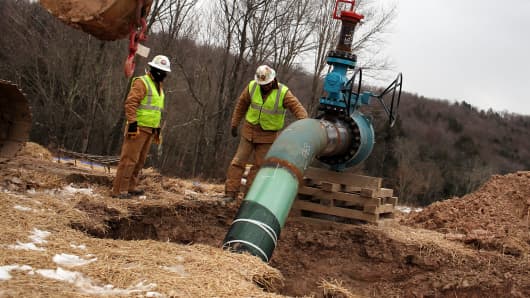Fears that energy producers will be unable to meet increased consumer demand in established and emerging economies are unfounded, and advances in technology will ensure that rising energy demands are met through renewable sources and oil from beyond the Middle East, Daniel Yergin, historian and author of "The Quest: Energy Security and the Remaking of the Modern World," told CNBC Monday.
Yergin, who remains chairman of IHS Cera, an energy consulting firm he co-founded in 1983, argues that a move away from fossil fuels like oil and coal toward natural gas and renewable sources will take place in coming decades as demand increases in emerging economies and oil prices remain high. He added that the "nuclear renaissance (is) over" following events at the Fukushima nuclear reactor in Japan and the subsequent rejection of nuclear energy by the German government earlier this year.
Yergin said China is attempting to lead the way on alternative energy, and they have the resources to invest in energy efficiency.
"I think (oil demand) has to abate and the Chinese have actually put energy efficiency at the top of their agenda because they realize that otherwise they have a disaster as their population motorizes… that's also a reason as to why they are really promoting the electric car and are kind of trying to take the lead in that industry," he explained.
Claiming it would be a "disaster" if the Chinese did not look to alternative sources of energy, Yergin said increasing numbers of car users in China had contributed to a significant rise in oil prices since 2004 - 2005.
"In 2004, the premise was that oil process were around $20 and they were going to collapse and 2004 is when the world woke up to the fact that China was not just a source of cheap goods, but in fact was a huge market in itself, and in that market last year 17 million new cars were sold, in the U.S., 11 million and that 17 million is going to go up and up," Yergin said.
"The whole cost structure of the industry is up and the other thing is the commodity demand from the emerging markets led by China and oil is part of that, and I think around 2004 - 2005 we went from a $20 world to the world we're in now," he added.
Yergin identified a number of "Western Hemisphere" oil sources that have become major suppliers to the United States, but he added that the costs involved in developing the technology for effective extraction meant gasoline prices would remain high for American drivers.
"We're seeing supply sources that we didn't see ten years ago… offshore Brazil, what's called "tight oil" in the United States, the expansion of oil sands in Canada, all of these are large resources, but it turns out they probably need $50 or $60 a barrel at least to do that," he said.
However, Yergin argues that a shift away from a dependence on Middle Eastern oil and toward Western Hemisphere-produced oil will have a significant impact on "the supply and politics of world oil," which for decades has focused on the Middle East.


